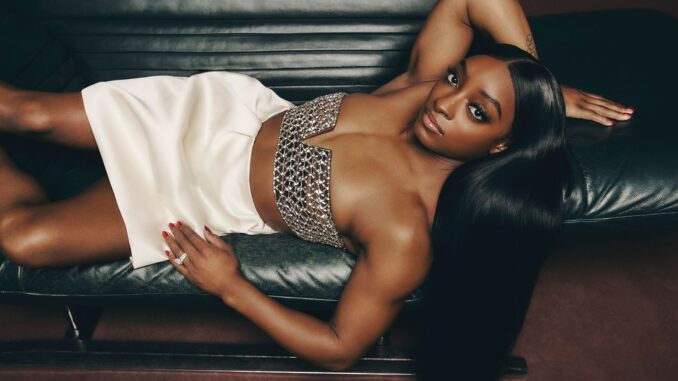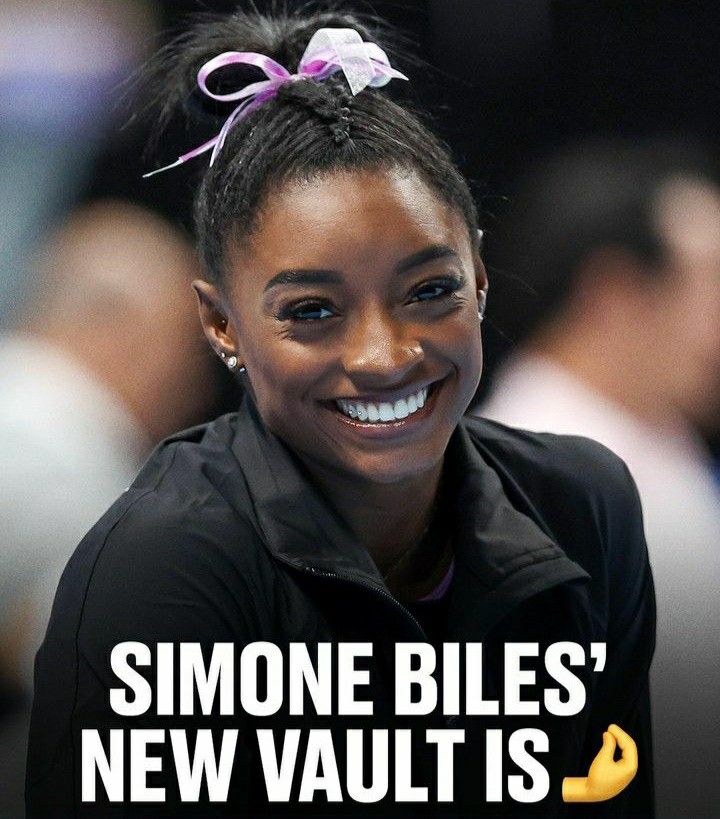
U.S. Olympic gold medalist Simone Biles, who has 1.9 million Twitter/X followers, has seemingly deleted her profile following the intense transgender feud against OutKick’s Riley Gaines, host of “Gaines for Girls.” Twitter/X users started sharing screenshots Sunday of Biles’ account leading to an error message, and this is how word got around that she may have nuked the account entirely.
The beef sparked up after Biles came at Gaines for wanting to keep transgender (biological male) athletes out of female sports. “You should be uplifting the trans community and perhaps finding a way to make sports inclusive OR creating a new avenue where trans feel safe in sports. Maybe a transgender category IN ALL sports!! But instead… You bully them… One thing’s for sure is no one in sports is safe with you around!!!!!” Biles said.
This led to even more personal attacks from Biles, including comparing Gaines to a man. But we all know the story: Biles ended up backtracking on her transgender support and issuing an apology to Gaines, giving the conservative activist the victory in their beef. But it appears that none of Biles’ public relations moves have worked, and that has resulted in her now deleting her Twitter account.
Could a single social media clash cause an Olympian to vanish from a platform? That’s what it seems like after Simone Biles apparently deactivated her X (formerly Twitter) account following a heated online debate with Riley Gaines around transgender athletes. In this piece, we’ll map out the timeline, examine the controversy, assess public reaction, and explore what this means for social media, free speech, and sports policy going forward.
The Spark — Riley Gaines’ Post and the Softball Team Controversy
What Gaines Wrote
It began when Gaines shared a screenshot of a post from the Minnesota State High School League announcing that the Champlin Park High School girls’ softball team secured a state championship. In her comment, Gaines mocked the situation, writing:
“To be expected when your star player is a boy.”
The subtext was clear: Gaines was suggesting that the transgender athlete on the team made a competitive difference—an allegation loaded with both social and political meaning.
The Context — Who Is the Trans Athlete?
The athlete in question is Marissa Rothenberger, a transgender high school student who pitched a shutout to help her team claim the championship. The school disabled comments on the post, likely in anticipation of backlash. Gaines’ post republished the content with the disparaging remark.
Simone Biles Replies — Strong Words and Public Fire
Biles’ Reaction on X
Simone didn’t stay quiet. She responded forcefully, calling Gaines “truly sick” and accusing her of bullying the trans community. Her remarks also included:
“All of this campaigning because you lost a race. Straight up sore loser.”
She challenged Gaines to consider inclusion or create separate categories for trans athletes, writing:
“Perhaps finding a way to make sports inclusive OR creating a new avenue where trans feel safe in sports. Maybe a transgender category IN ALL sports!!”
She also escalated the rhetoric:
“Bully someone your own size, which would ironically be a male.”
This comment about Gaines’ body, gender, or size was widely interpreted as crossing a line—leading to backlash even from those who generally support trans inclusion.
Once Biles made these remarks public, things spiraled. Online critics, allies, and pundits—all weighed in. Some said Biles should not have gotten personal, others defended her for calling out what they saw as transphobia. But the comment “bully someone your own size … a male” drew criticism even from sympathetic voices, who saw it as body-shaming and unnecessary.
At that point, the fight was no longer just about sports—it had become about tone, respect, boundaries, and identity politics.
Apology, Retraction & The Account Deletion
Simone’s Apology
After days of silence, Biles issued a public apology. She wrote:
“It didn’t help for me to get personal with Riley, which I apologize for.”
“The current system doesn’t adequately balance these important principles, which often leads to frustration and heated exchanges … we all want a future for sport that is fair, inclusive, and respectful.”
She admitted her frustration got the better of her, and acknowledged the complexity of balancing competitive equity and inclusion in sport.
Deactivation of X Account
Shortly after, Simone’s X account disappeared. Users looking at her profile saw only an error message: “Something went wrong.”
It’s not confirmed whether she voluntarily deactivated or was pressured into it, but most analysts link the move to the online drama and backlash she experienced.
Interestingly, her other social media accounts—like Instagram—remain active.
A Cryptic Aftermath
Later, Simone posted a cryptic message on Instagram:
“Strength is what we gain from the madness we survive.”
Whether this was meant to reference the feud, the backlash, or a broader personal reflection is open to interpretation.
Riley Gaines’ Response & Counterattacks
Gaines on Biles’ Deletion
Gaines didn’t miss a beat. She tweeted that Biles had an “incredibly unpopular and morally indefensible take,” underwent “unrelenting backlash,” then deleted her account “to pretend it never happened.”
Revisiting Biles’ Past
In response, Gaines unearthed a tweet from 2017—written by Biles—which stated,
“Ahhhh good thing guys don’t compete against girls or he’d take all the gold medals.”
Gaines used this to argue that Biles’ past statements undercut her current stance. She asked how “2025 Simone reconciled with the fact 2017 Simone was a ‘truly sick bully’ by her own standard?”
It became a sort of #receipts moment: the earlier tweet fueled accusations that Biles’ position is inconsistent or hypocritical.
Public Reaction & Cultural Fallout
The Sides Divide
This feud quickly turned into a microcosm of larger social debates. On one side: people defending Biles for speaking out, seeing her as a champion of inclusion and empathy. On the other: those who defend Gaines’ call for fairness in women’s sports, accusing Biles of undermining cis female athletes.
Criticism from Allies
Even some supporters of transgender rights raised concerns. They pointed to Biles’ choice of language: calling someone a “sore loser,” referencing “size,” and making personal attacks. Many said tone matters too, and that personal insults invite backlash—even when the cause is valid.
Media & Pundit Commentary
The media treated it as headline-making. Opinion columns explored whether high-profile athletes should wade into these debates. Some wondered if Biles, by virtue of her fame, underestimated how rapidly social media would amplify backlash.
Others saw her deletion as an example of social media fatigue or as symbolic of how digital platforms exert control—even over celebrities.
The Big Questions Raised
Should Athletes Speak Politically?
When should sports figures remain neutral, and when should they speak their truth? Biles’ plunge into this issue shows the risks—and potential impact—of stepping into political ground. It asks: do athletes bear responsibility for their public voice, or must they accept that social media is a high-risk space?
Where Do We Draw Fairness vs. Inclusion?
The underlying debate is not new: how do we balance fairness in women’s sports with empathy and rights for transgender athletes? Biles pointed out the system’s flaws, but the conversation is messy and emotionally charged.
Some propose trans-only divisions, others promote evolving medical and performance-based criteria. No single solution satisfies everyone.
Platform Power & Censorship
Her account deletion also touches on the larger issue: platform control. When someone “disappears” from a site, is that due to internal policy, public pressure, or self-preservation? Even for the most famous individuals, platforms wield power over visibility—and silence.
Lessons from the Feud
Tone Trumps Intent
If you’re going to wade into polarizing territory, how you speak matters. Personal shots can overshadow your message. Biles’ posture may have distracted from her larger point about inclusivity and fairness.
Reputation Vulnerability
Even icons can see reputations shift overnight. The incident underscores that public figures must navigate social media carefully; one misstep is enough to derail perception.
Debate Needs Nuance, Not Soundbites
Conversations over gender, sport, and fairness demand nuance—not tweets. The clash between Biles and Gaines shows how quickly nuance is lost in rapid-fire online discourse.

What’s Next for Biles, Gaines & Sports Discourse
Will Biles Return to X?
No official word yet. Some speculate she might rejoin when emotions calm; others feel this could be a long break. Meanwhile, she continues to post on Instagram and maintain other public presence.
Could This Inspire Policy Change in Sports?
The feud has renewed calls for sports governing bodies to clarify rules on transgender athletes. It may push groups to revisit eligibility criteria or to explore separate categories. Whether that translates into action is still uncertain.
The Bigger Cultural Impact
This isn’t only a sports story. It’s about identity, voice, backlash, platform dynamics, and how public figures engage—or retreat—in social discourse. The ripples will be felt in athlete activism, LGBTQ+ advocacy, and perhaps even how we think about social media itself.
Conclusion
Simone Biles’ apparent deletion of her X account isn’t just a social media move—it’s a flashpoint. It highlights how high-profile figures, online platforms, and culture wars intersect in the modern age. The Biles–Gaines clash laid bare tensions between fairness and inclusion, tone and intent, power and vulnerability. As sports bodies, social platforms, and communities struggle to keep up, one thing is clear: when icons step into controversy, silence is often louder than the words themselves.
